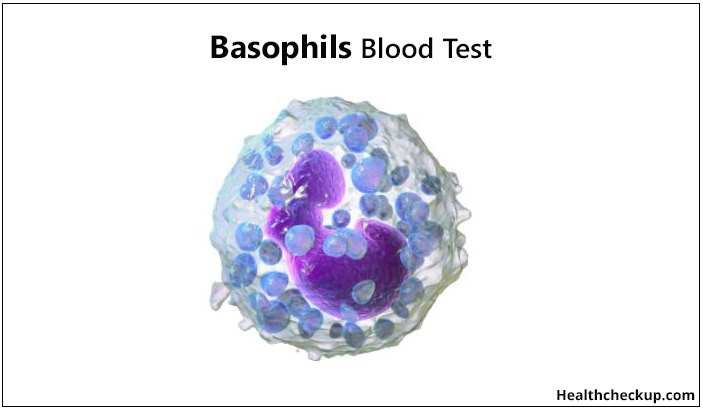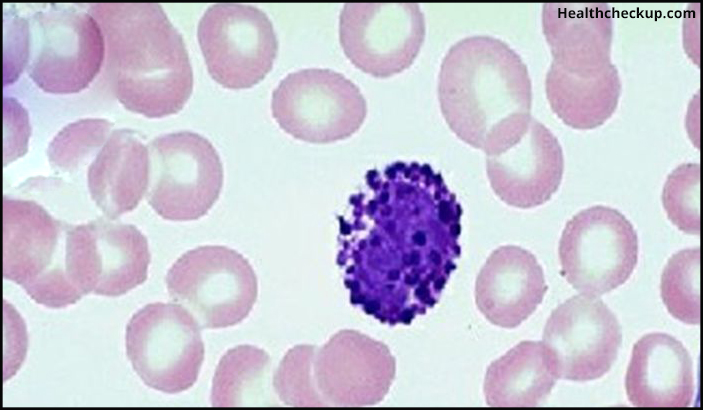The Basophils blood test helps to measure how many basophil cells are within a sample of blood at the time of the blood draw. It is often ordered as part of the complete blood count, but may also be ordered as an absolute basophils blood test as well.
What Are Basophils?
They are one of 5 different types of white blood cells [WBCs] that people have at any given time. These WBCs are just a small percentage of the total number that is present at any given time, but their role is incredibly important. They are responsible for the release of histamines that help to protect the body from certain substance exposures, such as pollen, dander, or mold.
What are Some Other Characteristics of Basophils?
Basophils will look black and blue or dark purple when stained by a basic dye, such as Wright stain. Dyes are colored stains that are used in laboratories, often to tell cells apart from one another. The nuclei of basophils come in various forms. The word “Nuclei” means more than one nucleus. A nucleus is the center of a cell. The grain-like particles of basophils contain the following substances
- Histamine
- Leukotrienes
- Heparin
Histamine is a substance found in all cells that are released during inflammatory and allergic reactions. Leukotrienes are substances in the body that produce allergic and inflammatory reactions, similar to histamine. Heparin is a naturally occurring substance in the body that prevents clotting (blood fluid coming together as a solid).
What is the Normal Range for Basophils?
Approximately 0.4% to 1% of white blood cells are basophils. This is the normal range of basophils on blood work tests. Basophils are the least common type of white blood cell.
When is the Basophil Blood Test Ordered?
Patients who are struggling with an unknown health condition that is similar to asthma or an allergic reaction may have this test ordered to measure histamine response. Basophils only make up 1% or fewer of the total WBCs that are found in the human body, so identifying their presence in relation to specific environmental or health conditions can help doctors discover there may be a treatable condition.
What Do High Basophil Blood Test Results Mean?
When test results are above 1% in the complete blood count for basophils, then this condition is referred to as basophilia. It may indicate a number of potential health conditions. Hives, inflammation anywhere in the body, food allergies, Crohn’s disease, and certain types of leukemia may all create extra basophils.
What Do Low Basophil Blood Test Results Mean?
If the test results show that there are fewer than 0.5% of WBCs that are basophils in a blood test, then this condition is referred to as Basopenia. There are only two primary health concerns that occur when there are results that are lower than normal: hyperthyroidism or severe allergies that have been left untreated.
When Are Extra Basophils Often Seen?
Parasitic infections are known to create abnormally high levels of basophils. The most common type of parasitic infection is heartworm that will spike levels. Most doctors who see this type of result where a parasite is suspected will see test results that are higher than they’ve ever seen before if they do not regularly treat parasites.
What Will Symptoms Cause The Basophil Blood Test To Be Ordered?
There are a number of different risk factors that can create some specific symptoms that are combined with the results of the basophils blood test to determine a suspected diagnosis. The presence of basophils in the blood alone is not enough for a detailed diagnosis in most cases, however, so additional testing may be required.
There are nearly 50 specific symptoms that are associated with abnormal basophil levels, so a complete examination is necessary. Most people will eventually be diagnosed with a minor condition, such as sinusitis, asthma, allergies, or even a residual chickenpox infection. People who have allergies will almost always have elevated basophil counts, even if those allergies are well controlled. Certain types of eczema also create higher than normal Basophils blood test results.
What are the Serious Health Issues That The Basophil Blood Test Can Detect?
Doctors who suspect that a patient may be suffering from Crohn’s disease or other similar autoimmune disorders may order the Basophil blood test based on symptoms that are being displayed. Certain vascular disease and chronic leukemia can be discovered through this test as well.
What are the Reasons for High Basophil Counts
People who are under a high amount of sudden emotional or physical stress may produce higher levels of basophils without an underlying health condition. People who have had a recent splenectomy will also typically have higher counts than normal.
What are the Reasons for low Basophils Counts
Basophils can be too low in people who have severe allergies. It can also be low in pregnant women and people under stress. Hyperthyroidism can also cause basophils to be too low. Hyperthyroidism is a condition in which the thyroid gland is overactive. See the previous section for a description of the thyroid gland. Basophils can be low in people who are taking corticosteroids. Corticosteroids are a group of drugs that act similarly to a natural chemical in the body known as corticosteroid hormone. Corticosteroid hormones control the body’s use of nutrients and the amount of water and salts in the urine.
What If My Basophil Blood Test Results Are Zero?
The most common reason why there would be no basophils seen in a blood test is because of an injury that caused bleeding. It may be an external or internal injury. Those who have recently had a blood transfusion may also see inaccurate results on their blood test and need to be re-tested in 4-6 weeks.
There is a very little risk in having a basophils blood test. Most people will have normal results. For those that have different outcomes, only a medical provider can compare symptoms and personal medical history to the results to determine a specific diagnosis.
Medically Reviewed By

I am an experienced Medical/Scientific writer with a passion for helping people live a happy healthy life. My thirst for writing has followed me throughout the years – it is there when I wake up, lingering at the edges of my consciousness during the day, and teases me at night as I go to sleep.









